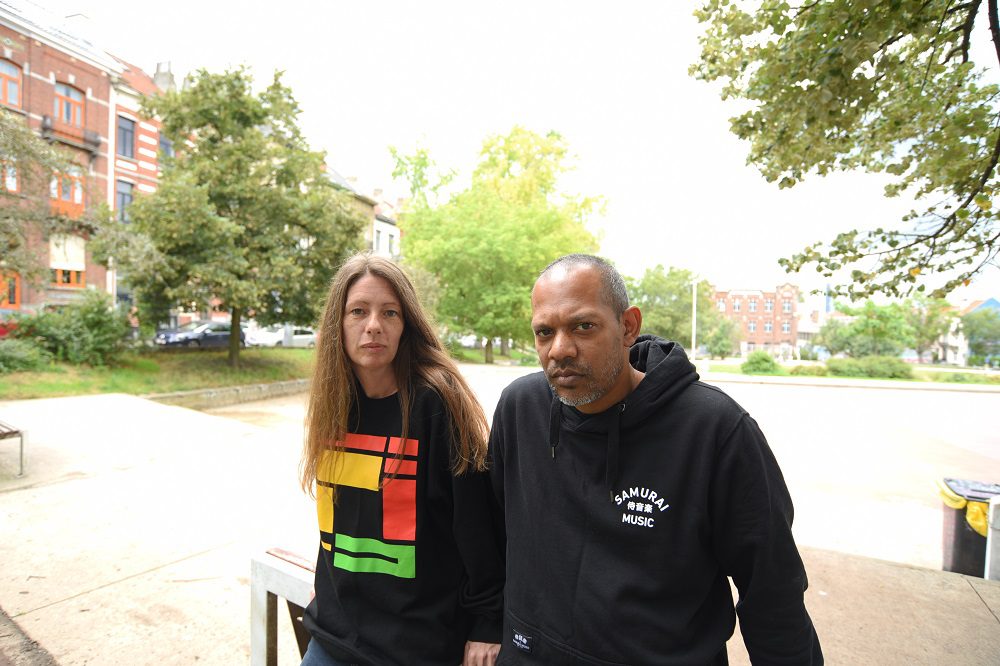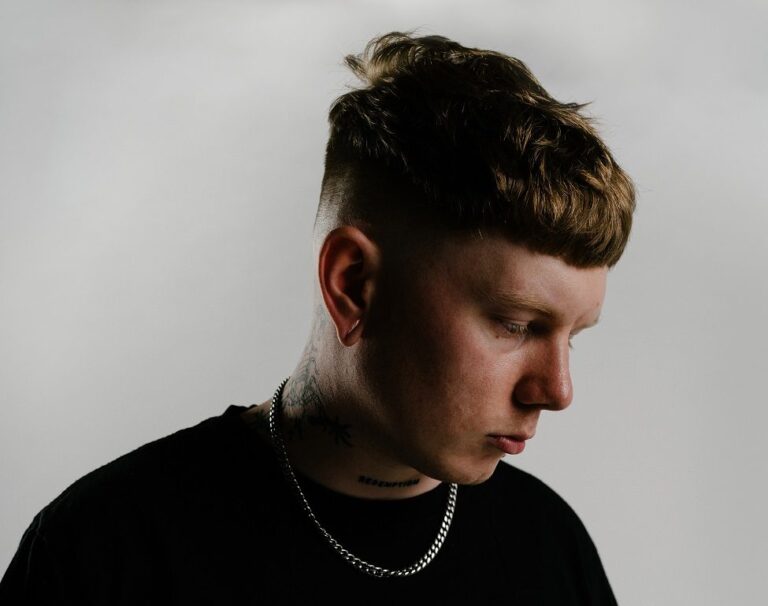Ironically for an act with a name like The Untouchables, Ajit Steyns and Kate McGill’s creative process is incredibly hands-on.
Both card-carrying hardware enthusiasts, their studio sounds like a veritable treasure trove of analogue machines and curios.
A few machines in their collection date right back to the 60s, many of the instruments are brand new, others have been hacked with parts from other similar machines in order to make them work. All of them play a role in The Untouchables’ unique and foreboding sound.
It’s a sound that dates right back over 20 years when Ajit was part of Universal Project, a collective who broke through in the early 2000s on labels such as True Playaz and Renegade Hardware.
Still using some of the very same machines he used back then, The Untouchables – who are also a married couple – started developing their sound throughout the 2000s, leading to releases on Alphacut, Mutable Beats, DNO, Rupture and Samurai with whom they released their debut album Mutations in 2018 and now the all-essential sophomore LP Grassroots.
Featuring collabs with the likes of Djinn, Mantra, Loxy and Sam KDC, and more of their machines than they’ve ever used on any previous bodies of work, Grassroots is a powerful journey through the starkest and most unforgiving terrains. In true Samurai spirit, the album blurs the lines between D&B and techno but the groove always remains the focus as they dig deeper and deeper into their unique analogue sound. We pulled them away from their kit for a moment to find out more…
I love the fact you’re a couple and you make music together. That must be a vibe! What came first, the music or your relationship?
Kate: We were just friends to start out with. I was running a night here in Belgium while Ajit was studying in university in the UK. I was booking him and he said we should DJ together.
Ajit: Yeah we DJ’d together quite a lot before we got together. Then we were a couple for years before we got married. It’s been a long time!
Kate: We’ve just always clicked, personally and musically as well. Sometimes we like different tunes and different styles but always met in the middle. That’s how we’ve created The Untouchables sound.
And what a sound! So I believe Grassroots was created largely on hardware, right? Old and new?
Ajit: Yeah any age, we don’t care, we just love using machines! We started re-buying machines a lot in the last few years. At first mainly drum machines. They’re really good fun but very limited. Some talk to each other. Some work perfectly. Some don’t. The Arturia we have, for example, it’s BPM is completely wrong. So you can’t link that with your DAW because it will cause you too much work. But the Akais work with anything. They’re perfect for old machines, new machines and you can put it in the centre of the studio. Then we got some Elektrons…
Kate: We started with Elektron Model Cycles and Model Samples, but they were very limiting so we flipped that and got the Digitone and Digitakt, which are brilliant machines.
This all sounds amazing. So your whole process is very hands-on. Almost so you’re not even looking at screens during a lot of the process?
Kate: For a lot of the time, yeah!
Ajit: It’s like there are two parts of the process. With the machines we are getting inspired. You hear a sound that inspires you, you put it through another machine and play around with it, then put it through another and another and match the ideas with others in other machines and then put it in the DAW.
Kate: We’ll add a machine at a time and build from there and add a new dimension each time.
I remember reading that you had your old E-Mu sampler running in your debut album Mutations in 2018. Was that was the only old machine running on that album? And is Grassroots essentially a development of that? Like the blossoming seeds of an earlier idea?
Ajit: Yeah definitely
Kate: And, in between the albums, we also had our EP for Rupture which had the track Lifeforms which was made on a Tanzbar drum machine and the Arturia Impact and effects on our Eurorack. That was a turning point where our workflow started changing more toward outboard units.
Ajit: That was fun. New toys really inspire us.
Yeah you can tell! So were there particular tracks on the album which pin-point the moment it went from an EP to a bigger album-sized project?
Kate: I think so. It was when we made Fouls Game and Grassroots. It was around Christmas when Ajit opened up one of our samplers…
Ajit: Oh yeah, we had to hack one of them! We’ve got an E-Mu E-Synth and an E-Mu E-64 Ultra. We had to take the wheel and the buttons from the E-Synth and put them in the Ultra.
Oh gosh this wonderfully DIY!
Ajit: It’s actually the same sampler than I used in Universal Project. It was funny but it worked and I think it helped with the sound. I’m a true believer that every machine has its own sound and that sound is affected through the converters and the whole analogue process. It’s what I think is missing in a lot of productions today because people are using class compliant USB and miss out on all the richness of its sound.
Yeah it takes out the character, which is the spice of a lot of those old classic sounds especially. The hiss and the crackle. Even, with some machines, the heat and the length of time it’s been on can change the sound, right?
Ajit: That’s right. We’ve got an old spring reverb which was made in 1964 it’s got all that old noise and everything.
Is that the oldest machine you’ve got in your collection?
Ajit: I think so. We’ve got a Star Instruments Synare, but that’s from the early 80s.
Kate: And an old 505 from around that time as well.
Wow you guys basically have an Aladdin’s cave of toys! The pair of you must have loads of fun and the studio was probably your saviour during lockdown?
Kate: It really was. It was a life line and kept us sane!
I bet! So back to Fouls Game and Grassroots. It’s no coincidence they’re the first and last tracks on the album if they were the tracks that led you from EP to album mindset, right?
Kate: Yeah we took it more seriously from the point we opened up the samplers and used them against the Akai MPC Live. Once we had those tracks down we sent them to [Samurai founder] Geoff Presha and he said, ‘These are great, how do you feel about doing an album?’
Ajit: We started getting some really cool collaborations around then as well
I was going to mention the collaborations. Nice to see another track with Loxy, continuing the X theme with Genetic X!
Kate: We’re big comic fans so all our titles when we do collaborations with Loxy will relate to the names in comics!
I think it’s Loxy’s sets where I’ve heard your music the most. How far do you go back?
Ajit: Oh I’ve known him since 97 or 98. He used to come to my house with Keaton when I was studying in the UK. Before Universal Project, before Usual Suspects. We go way back.
Kate: We’ve known him for time. He’s such an inspiration and a killer DJ and producer
He’s the hitman! So how does it work with collabs when you’re working off a lot of hardware?
Ajit: We stem out the project. So we either send them an idea that we’ve made with sounds we’ve created in the studio. Or they start an idea and send it to us to mangle in the studio and we’ll send it back. From there they can change it again or we roll it out.
Kate: That’s how the Mantra collaboration came about, too. We asked her if she wanted to be part of the album because we really respect her. She sent over an idea, we did our thing, she loved it and Sent it back and forth, then finished it off.
Ajit: We’ve done a few tracks with Mantra now. One of her first releases was with us.
You guys and Mantra and Double O are the only two couples that I know of who operate in this world. How far do you all go back?
Kate: It was long time ago because we linked with them in the MySpace days! So I think it was like 2005. They got us down for a Rupture night and it just clicked. We all got along so well. I love what they’re doing. They’re doing it all for the music, they’re so inspiring and we’re in tune with that.
Totally! You’re also very much on the same experimental, futurist jungle edge.
Kate: It’s always been part of us musically. I used to play a lot of old school jungle and ragga jungle. The heavy subs and rolling breakbeats; it’s all linked
Ajit: You can hear it in our music. It’s not the most obvious sound, but it goes back to the roots of what it was when it was sample-based and the sounds were made on those original machines. That’s what Grassroots was about, really.
Kate: Yeah it’s funny; as we were playing around we would find these sounds and be like, ‘Oh that sounds like Digital!’ Or, ‘That’s a Loxy stab!’
Brilliant. Also got to mention the techno influence. Sorcerer Supreme is a particular persy for me and that’s totally techno in its spirit.
Ajit: We live in Belgium and techno is a big, big thing here so it’s hard to avoid.
Kate: I went to school with some of the big Belgian DJs. They would take me along to a lot of nights, so it’s been a big part of what I listen to and my understanding of electronic music since the earliest days.
I was going to ask about Belgium. You’ve got every flavour of D&B in your country. From the experimental stuff you guys do to the big crossover pop stuff like Netsky. There’s massive events Rampage but also headsy stuff like Starwarz and of course Bredren who are killing it.
Ajit: Yeah there is also the Mentality guys who are pushing our sound in Brussels. Even though Belgium is a small country I would say the scene here is not as big as it should be.
Kate: Quite a few clubs have closed down because of covid, so there are even less nights now, besides the ones you mentioned.
Ajit: It’s a very close-knit niche, so we all know each other though.
Bredren have done bits for the deeper side in Belgium haven’t they?
Kate: They’ve done some sick nights with Mentality at The Fuse which is actually a techno club. They’re working hard to keep the scene alive. Of course we have to give shouts to One87, too. He’s been there from day one pushing the Starwarz night in Gent .
And you guys are working hard! It’s clear Grassroots was definitely not a classic ‘difficult second album’ situation, are you still inspired for next album?
Ajit: We’re actually taking it easy for the last few months
Kate: Getting inspired and recharging…
And playing gigs hopefully!
Kate: We’ve played in Croatia, Brighton and Berlin since things opened up, but not here yet because the lockdown was longer in Belgium.
Ajit: They’ve been great shows, though. I love playing out, even more than I do sitting in the studio.
Wow I didn’t expect that with such a love for the hardware!
Ajit: I love how you get to test your tunes out and see the reactions of people. It’s a much more social experience. Most the time it’s just us playing around the studio, or someone coming round to collaborate, which is great fun, but you need to see the people’s reactions.
Kate: That was the hardest thing during the lockdowns; to not see the reaction of the dancefloor and not have people go off to the music.
But it didn’t affect the process. If anything I’d say Grassroots is more club-focused and heavier than Mutations!
Ajit: Maybe. I think because it’s the second album and we were able to express ourselves more and feel a bit more free. The next album will be even more of a freeing experience…
Experience The Untouchables: Soundcloud / Facebook / Twitter


